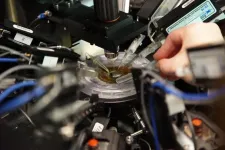(Press-News.org) The linear consumption model of raw material extraction, production, use, and disposal dominates the global economy, but it’s led to serious unintended global consequences: from resource use to pollution including negative impacts on environmental and human health that disproportionately affect the Global South.
In contrast, circular economy – a model where products and materials are by design kept in continual use – aims to decouple economic growth from resource consumption.
While approaches to implement a circular economy (CE) approach continue to be discussed at the highest levels of government and global organizations, cities and communities are at the frontlines. Getting a CE to work in practice requires collaboration between government, businesses, local stakeholders and everyone in between.
A research team from the University of Georgia College of Engineering and the University of Pittsburgh’s Mascaro Center for Sustainable Innovation (MCSI) and Swanson School of Engineering have been awarded a $5,000,000 cooperative agreement with the National Science Foundation (NSF) to continue their efforts to build a circular economy. This Phase 2 project, Track I: SpheriCity -- Circularity from Molecules to the Built Environment in Communities, is a continuation of their Phase 1 project, “A Tale of Two Cities: Optimizing Circularity from Molecules to the Built Environment,” and is part of the NSF's Convergence Accelerator.
“The primary goal of Phase 1 of this project was to use the Circularity Assessment Protocol (CAP) framework – a standardized assessment protocol used to inform decision-making on materials usage and management – to converge circularity across four different categories: molecules, plastics, organic materials, and the built environment,” said Jenna Jambeck, Georgia Athletic Association Distinguished Professor of Environmental Engineering and PI. “In Phase 2 we're making it easier for cities to conduct CAP, so community experiences can translate to eleven other locations throughout the US, eventually scaling to hundreds of cities.”
The team, called SpheriCity, also includes seven industry, government and NGO partners.
“We are using a network of networks approach in Phase 2. For example, we have partnered with the Green Building Alliance and working with their amazing leadership and team to expand the reach of CAP,” said Melissa Bilec, co-director of Mascaro Center for Sustainable Innovation, Special Assistant to the Provost for Sustainability, and the George M. and Eva M. Bevier Professor of Civil and Environmental Engineering at Pitt. Dr. Bilec is the co-principal investigator. The research team at Pitt also includes Dr. Amy Brooks, post-doctoral associate, and Nicole Bell, doctoral student.
Adding Construction and Demolition to the Original Plastics CAP
SpheriCity is expanding the CAP developed in Phase 1 to different materials outside of only plastics and organics by creating the first version of the Construction and Demolition (C&D) Convergence CAP.
Pittsburgh was used as a pilot location to understand what a Construction and Demolition CAP would look like when scaled to cities across the world. The methods and lessons learned for the newly updated and expanded CAP will be used for future implementations, including 11 new cities for Phase 2.
“The goal of the C&D Convergence CAP is to further educate cities and governments on moving toward circularity and to empower users to make more informed decisions,” Bilec said. “By understanding the value of materials already in use in their area, they can develop methods to recycle and reuse construction materials through deconstruction in order to meet their goals of reducing embodied carbon and meet their zero waste goals.”
As it continues to grow, the data will be publicly available through the Debris Tracker open access tool developed by Jambeck’s lab – joining over 7 million other data points in nearly 100 countries across the world.
Training Today for a Less Toxic Tomorrow
Circular economies thrive on collaboration and transparency with communities.
SpheriCity is creating a dynamic portal that simultaneously provides CAP data collection training, open-source data sharing, and intra- and inter-community collaboration.
The SpheriCity Portal is providing asynchronous remote training to local partners on how to conduct the integrated SpheriCity CAPs in their own communities. Additionally, the existing 51 cities that have completed plastics CAPs could expand to C&D and/or organics using the portal. Through dynamic data dashboards, this portal will also provide data and the ability to interact with it. Users will be provided the option to connect with others and participating cities, enabling dialogue to further circular economy opportunities.
“Local knowledge and expertise are the foundation of the information that the community uses to move toward circularity,” Jambeck said
The NSF Convergence Accelerator program uses a convergence approach, bringing together teams from various fields to transition their basic research to high-impact solutions for societal challenges.
The SpheriCity Convergence Accelerator project is anticipated to continue through 2026.
END
Convergence and collaboration to achieve circularity
2024-06-04
ELSE PRESS RELEASES FROM THIS DATE:
Wayne State University partners with Great Lakes Water Authority to help train water pipeline managers of the future
2024-06-04
DETROIT — The Great Lakes Water Authority (GLWA) has partnered with Wayne State University to develop its Workforce Development and Pipe Management Program, which will help recruit, teach and graduate the next generation of water pipeline managers. The two-year program will begin July 1, 2024, and will be supported by a contract totaling more than $480,000.
The GLWA says that water utilities are experiencing significant employee recruitment, training and retention challenges. An additional concern is the availability of specialized technical training that addresses recent technological advances in the water sector. In response to these challenges, the Workforce Development and ...
NRG Oncology abstract considered “best of ASCO” for 2024 shows difference in outcomes for node-negative versus node-positive pancreatic cancer patients when adding chemoradiation to systemic therapy
2024-06-04
NRG Oncology recently reported the results from the radiotherapy randomization, which was the second step of their NRG-RTOG 0848 clinical study comparing adjuvant chemotherapy with or without chemoradiation for patients with resected periampullary pancreatic adenocarcinoma. The trial data did not show that the addition of radiation and chemotherapy to adjuvant systemic therapy improved overall survival (OS) for all patients on the study, however, OS was improved among node-negative patients. OS was essentially the same between treatment arms for node positive patients. The trial data also showed that disease-free survival (DFS) was improved with ...
Emma Guttman-Yassky, MD, Ph.D., receives high honor at European Academy of Allergy and Clinical Immunology
2024-06-04
Emma Guttman-Yassky, MD, PhD, Receives High Honor at European Academy of Allergy and Clinical Immunology
The Paul Ehrlich Award for Experimental Research recognizes scientists who have revolutionized the understanding of allergic diseases and immunological mechanisms.
New York, NY (June 4, 2024) – The 2024 European Academy of Allergy and Clinical Immunology (EAACI) Annual Congress selected Emma Guttman-Yassky, MD, PhD, Waldman Chair of the Kimberly and Eric J. Waldman Department of Dermatology, and Professor of Dermatology and Immunology, Icahn School of Medicine at Mount Sinai, as the recipient of the ...
An anti-inflammatory curbs spread of fungi causing serious blood infections
2024-06-04
A team of UC Davis Health researchers discovered that a common anti-inflammatory drug, mesalamine, can replace the work of good bacteria in fighting the nasty fungus Candida albicans in the gut.
C. albicans, or candida, is known to cause yeast infections. In some cases, it develops into invasive candidiasis, a potentially fatal infection occurring mostly in patients with compromised immunity.
The researchers found that this fungus can’t grow without an oxygen supply. Their study in mice showed that the drug can ...
Intracerebral hemorrhage stroke outcomes improve with early minimally invasive surgery evaluated in clinical trial
2024-06-04
INDIANAPOLIS – Patients with an intracerebral hemorrhage have better medical outcomes when surgeons perform an early minimally invasive removal of a hematoma compared to those receiving the standard of care, according to a study published in the New England Journal of Medicine.
Indiana University School of Medicine faculty clinicians Mitesh Shah, MD, Bradley Bohnstedt, MD, Regg Singh, MD and Jason Allen, MD, PhD are co-authors ...
UC San Diego Health first in region to provide novel therapy for melanoma
2024-06-04
UC San Diego Health is the first hospital system in the region to offer a new immunotherapy treatment for metastatic melanoma. The personalized cellular therapy derived from tumor infiltrating lymphocytes (TIL), is the first solid tumor therapy on the market approved by the U.S. Food and Drug Administration (FDA).
“This one-time cellular immunotherapy is a powerful and robust tool to treat patients with advanced melanoma resistant to other approved therapies and who have limited treatment options,” said Gregory Daniels, MD, PhD, professor of ...
Zapping the right brain cells: The path to improved stimulation
2024-06-04
By Jake Siegel
SEATTLE, WASH.—June 4, 2024—New research by scientists at the Allen Institute’s Brain and Consciousness group and Cedars-Sinai offers an unprecedented look at how neurons respond to ES. Far from being uniform, different types of neurons showed distinct patterns of ‘syncing up’ with electrical fields. These patterns varied depending on the rate at which the ES was delivered.
The findings, published today in Neuron, could help doctors fine tune where, when, and how ...
How an Indian government policy backfired: the unintended consequences of price regulation of prescription drugs
2024-06-04
Researchers from Indian Institute of Management Calcutta, University of Chicago, and Management Development Institute, Gurgaon published a new Journal of Marketing study that examines the unintended consequences of an Indian government healthcare policy.
The study, forthcoming in the Journal of Marketing, is titled “Do No Harm? Unintended Consequences of Pharmaceutical Price Regulation in India” and is authored by Saravana Jaikumar, Pradeep K. Chintagunta, and Arvind Sahay.
In countries without universal health insurance or developed health care systems, governments try to make drugs affordable and accessible. For instance, ...
Exercising during pregnancy normalizes eating behaviors in offspring from obese mice
2024-06-04
Maternal obesity impacts the eating behaviors of offspring via long-term overexpression of the microRNA miR-505-5p, according to a study publishing June 4th in the open-access journal PLOS Biology by Laura Dearden and Susan Ozanne from the MRC Metabolic Diseases Unit, Institute of Metabolic Science, University of Cambridge, UK, and colleagues.
Previous studies in both humans and animal models have shown that the offspring of obese mothers have a higher risk of obesity and type 2 diabetes. While this relationship is likely the result of a complex relationship between genetics and environment, emerging ...
Managing mental health should be about more than mind
2024-06-04
Clinicians often default to treating mental health conditions with a variety of medication. This approach, however, largely ignores the role of environment, lifestyle, and social factors. Mental Health professionals must work toward a more holistic management picture, Sidarta Ribeiro, Ana Paula Pimentel, Paulo Amarante and colleagues at the Federal University of Rio Grande do Norte, Federal University of Rio de Janeiro and FIOCRUZ in Brazil argue in the new open-access journal PLOS Mental Health on June 4.
More people than ever are being diagnosed with mental health conditions—particularly children and young adults. The World Health Organization estimates that mental health ...


